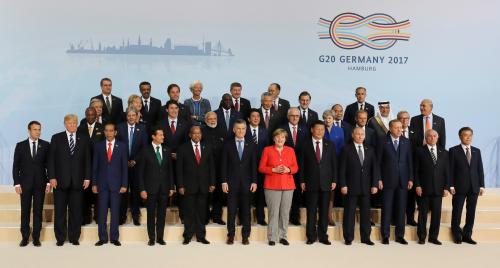Below is a viewpoint from Chapter 2 of the Foresight Africa 2018 report, which explores six overarching themes that provide opportunities for Africa to overcome its obstacles and spur inclusive growth. Read the full chapter on sustainable financing for African development here.
Long seen as the Brain Drain continent, Africa looks to reap greater dividends from its diaspora, beyond the $40 billion the World Bank estimates it receives in remittances. In 2011, Ethiopia floated a diaspora bond to fund the Grand Ethiopian Renaissance Dam. More recently, Nigeria successfully issued a $300 million bond to fund infrastructure projects in the country.
Diaspora bonds are simple. A country issues foreign-currency debt targeted at nationals living outside its borders, hoping to benefit from a patriotic dividend that offers lower pricing. If successful, the issuer receives crisis-resilient foreign-currency funding; in return, the diaspora is given a chance to contribute their quota to national development.
They are also potentially game changing. Remittances are only a fraction of annual diaspora savings, believed to be more than 3 percent of regional GDP for sub-Saharan Africa alone. In Ghana, diaspora savings may be as high as 85 percent of gross national savings.
In Ghana, diaspora savings may be as high as 85 percent of gross national savings.
To tap into this pool of capital, African governments must learn from the mistakes of the past—both theirs and others. For example, Ethiopia’s first diaspora bond collapsed over environmental concerns and mistrust of the government. And outside Africa, Nepal’s issue was significantly undersubscribed once it decided to offer well-below market rates.
Regulation and culture are even trickier, yet provide avenues for short-term redress. After Ethiopia’s state-owned electricity company got into hot water with the United States Securities & Exchange Commission (SEC) over its 2011 diaspora bond issue, Nigeria sidestepped such concerns, registering its bond with both the SEC and the United Kingdom Listing Authority. For diaspora, the tax and legal status of their bond holdings is a crucial variable in assessing the attractiveness of the offering.
But for diaspora bonds to work on the continent, African nations must establish stronger ties with their diaspora. Israel, the most prominent success story of diaspora bonds, has a diaspora legacy that dates back to the 1950s. Other countries have gotten in on the act—Georgia recently established a Ministry of Diaspora Affairs, and Ireland has developed an aggressive strategy for courting its successful diaspora and, crucially, supporting its struggling ones.
African countries may be taking note—Nigeria signed a Diaspora Bill into law in 2017. More can still be done, particularly in terms of marketing long-term development plans to diaspora and permitting them more influence in politics and society. The latter seems so obviously beneficial as it presents an avenue for the Brain Drain continent to benefit from its exceedingly talented diaspora. The message should be simple: Africa needs your money, but it could use your skills too.
The Brookings Institution is committed to quality, independence, and impact.
We are supported by a diverse array of funders. In line with our values and policies, each Brookings publication represents the sole views of its author(s).







Commentary
Foresight Africa viewpoint – Debt by diaspora: Ties that bond
January 24, 2018
Michael Famoroti explains the function of diaspora bonds and advises how this type of financing can be leveraged to boost African development.